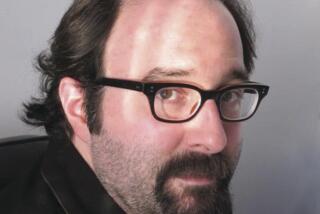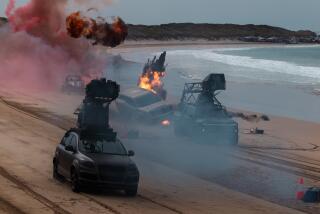OUT OF BREATH
- Share via
“The Running Man” keeps running and running and. . . .
Originally for summer, Tri-Star’s now planning on the November slot once reserved for “Rambo III” ( yet to go before the cameras). And the budget for the futuristic tale that has Arnold Schwarzenegger running for his life in a gladiator-type competition has ballooned from $10 million--its original budget, when it was a vehicle for Christopher Reeve--to $28 million.
The film’s also had five directors and now come reports of editing room travails.
Screenwriter Steven de Souza (“Commando”) acknowledges that he’s acting as a editing consultant. And several sources report that not everyone is on the same track with the final cut. “Let’s just say there are differing opinions as to what this film should be,” said one.
But, said director Paul-Michael Glaser, “You have to remember that this film has complex visual effects which can slow down the process.”
Said executive producer Keith Barish: “The pacing has got to be exact--because that’s the key to an action-adventure.”
Based on a novel by Richard Bachman (Stephen King’s pseudonym during his pre-fame days), “Running Man” was going to be directed by George Cosmatos (hot off “Rambo”), teamed with Reeve. That was August, 1985.
Cosmatos required a higher budget than Taft/Barish wanted to authorize; they parted ways.
Also involved during pre-production were Flemish writer-director Carl Schenkel (“Out of Order,” about a haunted elevator) and Ferdinand Fairfax (“Nate ‘n Hayes”). Fairfax took the film to story-board status.
When Schwarzenegger later agreed to star, he suggested Andrew Davis (“Code of Silence”) to direct. But Davis was canned after nine days of filming (Davis is currently filming Warner Bros.’ “Above the Law,” an actioner set in Chicago).
With only two days’ notice, Glaser--who has done “Band of the Hand” and lots of TV--ran in.
“He did an amazing job of playing catch-up ball,” said one crew member.
Glaser put it this way: “I came in and basically shot what the producers wanted me to shoot. I guess you could say I was a problem-solver. I approached the project reactively as opposed to conceptually.”
Said optimist Barish: “What we now have is a star with tremendous international appeal--and a film that, when all’s said and done, will be wonderful.”
More to Read
Only good movies
Get the Indie Focus newsletter, Mark Olsen's weekly guide to the world of cinema.
You may occasionally receive promotional content from the Los Angeles Times.










